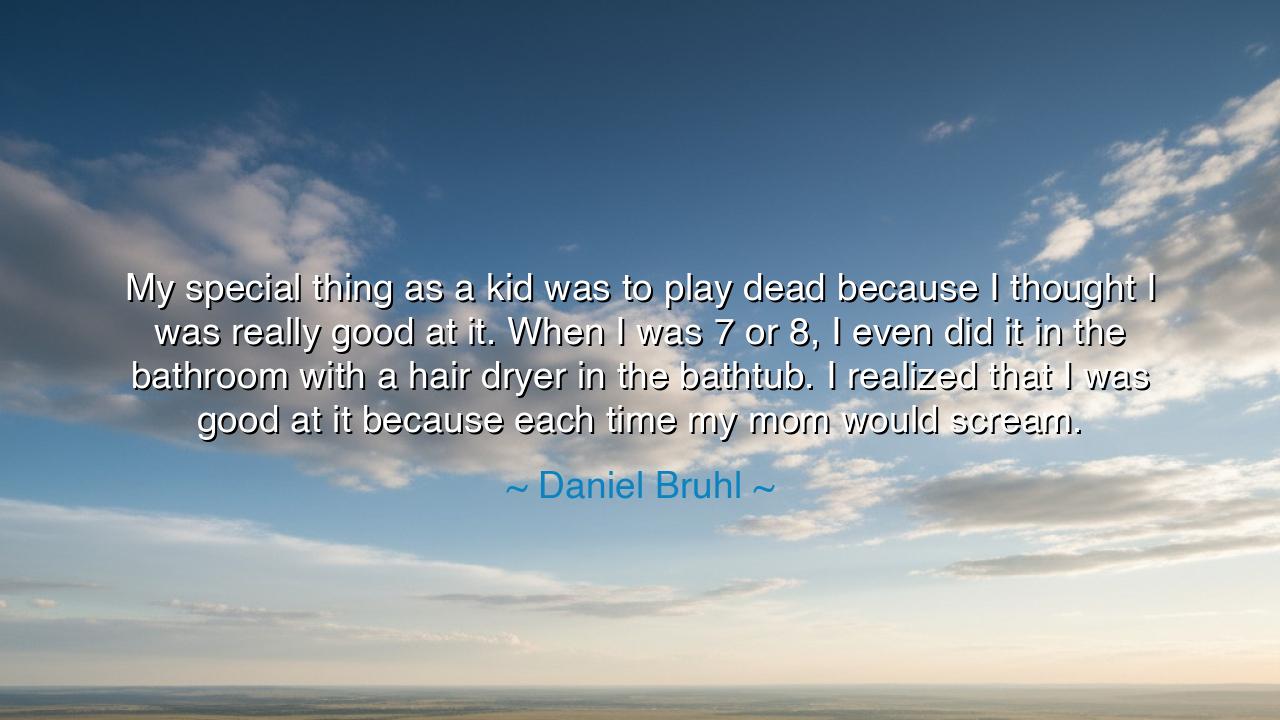
My special thing as a kid was to play dead because I thought I
My special thing as a kid was to play dead because I thought I was really good at it. When I was 7 or 8, I even did it in the bathroom with a hair dryer in the bathtub. I realized that I was good at it because each time my mom would scream.






In the strange and revealing words of Daniel Brühl, there lies a truth both innocent and profound: “My special thing as a kid was to play dead because I thought I was really good at it. When I was 7 or 8, I even did it in the bathroom with a hair dryer in the bathtub. I realized that I was good at it because each time my mom would scream.” To the casual ear, these words may sound merely mischievous — the confession of a boy testing the boundaries of childhood imagination. Yet beneath their humor and shock lies a reflection on the longing for attention, love, and recognition that lives within every human being. The child who “played dead” was not courting danger for its own sake, but reaching out — seeking the raw, unmistakable proof that he was seen, that his existence mattered enough to stir another’s heart.
Daniel Brühl, the German-Spanish actor known for his depth and intensity, spoke these words while recalling his youth — a time when creativity, curiosity, and a streak of mischief intertwined. In his recollection, we glimpse not just a boy’s prank, but the early seed of an artist’s gift: the ability to embody life and death so vividly that it could evoke real emotion in another. When his mother screamed, it was not cruelty that pleased him, but the confirmation of connection — that what he had done had power, that he could move someone’s heart. Thus, hidden within his boyhood folly was the earliest expression of the actor’s sacred craft: to awaken emotion through illusion.
The ancients would have recognized something holy in this. In ancient Greece, actors were called hypocrites — not in the modern sense of deceit, but as vessels of truth cloaked in pretense. They knew that the act of imitation, when done with sincerity, revealed the very essence of life. Even in pretending to die, one can remind others of their own mortality, their own tenderness. Thus, in Brühl’s childhood “playing dead,” we may see the first glimmer of this archetypal power: that to perform, even in jest, is to bridge the gap between appearance and reality, between the seen and the felt. Art begins where play deepens into meaning.
Yet, there is something darker and more human still in his tale — the hunger for acknowledgment that runs through every soul. The child learns early that love is not always constant, that attention must sometimes be earned. Some seek it through excellence, others through rebellion, and some, like young Brühl, through shock — by testing how far they can push the world before it truly reacts. His mother’s scream, in its fear and love, became proof that he was not invisible. How many among us, even as adults, still repeat this pattern — creating drama, chaos, or spectacle, simply to feel that someone still sees us? The lesson hidden within his memory is not about mischief, but about the universal need to be witnessed, to know that our lives touch others deeply enough to stir their souls.
The ancient poets wrote often of this yearning. The myth of Icarus tells of a boy who, longing for freedom and attention, flew too close to the sun. His fall was not born of arrogance alone, but of desire — to be more than ordinary, to feel alive through risk. Brühl’s childhood act carries a gentler echo of that same impulse: to flirt with danger not for destruction, but for recognition. Yet, as every wise soul learns, attention gained through fear cannot sustain the heart; only love given freely can. The boy who played at death became, in time, an artist who plays at life — transforming the reckless energy of youth into the disciplined passion of creation.
And so, in reflecting on his memory, we glimpse not morbidity, but awakening — the journey from raw impulse to refined expression. The boy’s instinct to evoke emotion became the man’s vocation: to move hearts through story, to awaken empathy through art. What once frightened his mother now inspires the world. The artist’s power lies in this transformation: to take the reckless innocence of childhood — the need to be seen, the daring to provoke — and forge it into beauty, truth, and meaning.
The lesson, then, is twofold. First, let every parent, teacher, and guardian remember that attention is nourishment, and that the child who acts out is not wicked, but hungry for connection. Second, let every person remember that the longing to be seen is not shameful — it is part of what makes us human. Yet we must learn, as Daniel Brühl did, to channel that longing not into harm or shock, but into creation — to find our own art, our own voice, our own way of saying, “I am here, and I matter.”
Thus, from the strange mischief of a child playing dead emerges an eternal truth: that beneath every act of defiance or daring lies the same desire — to awaken love. The scream of the mother, once a sound of fear, becomes a symbol of connection, of life affirmed through emotion. And so, as the ancients might have said, the child who played with death was not courting darkness at all, but reaching instinctively toward the light of meaning — toward the eternal art of reminding the world that every life, every gesture, every story, deserves to be truly seen.






AAdministratorAdministrator
Welcome, honored guests. Please leave a comment, we will respond soon